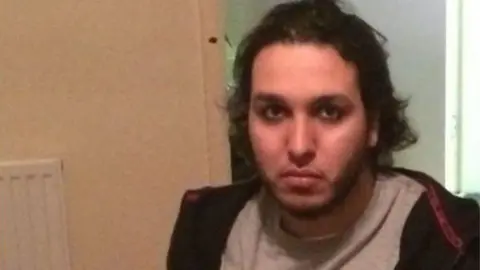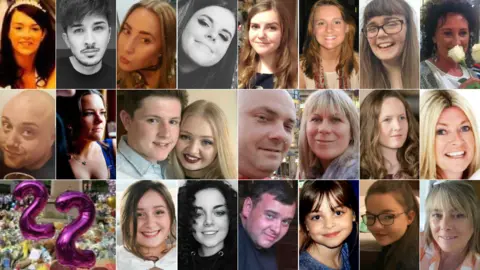Manchester Arena Inquiry: Terror offender 'will not answer questions'
 Police handout
Police handoutA convicted terror offender who was the Manchester Arena bomber's friend has refused to co-operate with the inquiry into the attack, his lawyers have said.
Abdalraouf Abdallah, from Manchester, was visited by Salman Abedi in jail in the months before his 2017 attack.
Abdallah, who denies any involvement in the bombing, was jailed for terror offences in May 2016.
The Manchester Arena Inquiry is due to hear from the 27-year-old as part of evidence about Abedi's radicalisation.
Twenty-two people were killed when Abedi detonated his device at the end of an Ariana Grande concert on 22 May 2017.
Lawyers for the families of those who died have insisted Abdallah should be forced to give evidence.
'Full capacity'
Rajiv Menon QC, representing Abdallah, told the inquiry if his client was compelled to be a witness, his advice would be to not answer any questions for fear of incriminating himself, adding that "nobody can force" him to answer questions.
He said the "spectacle" of Abdallah sitting through "hours of questions" would "serve no useful purpose" and would merely "frustrate" everyone at the hearing.
Abdallah's lawyers have also argued he is "medically unfit" to give evidence and forcing him to do so would breach his human rights.
The inquiry heard Abdallah had been diagnosed with post traumatic stress disorder, as a result of life-changing injuries he received while fighting in Libya, and had self-harmed on numerous occasions in prison.
Abdallah was jailed in 2016 after being found guilty of helping people travel to Syria to join the Islamic State group and was returned to prison in January, a few weeks after being released on licence.
Consultant psychologist Dr John Kent, who assessed Abdallah, told the inquiry he had "full capacity" to give evidence to the inquiry and his illness would not prevent him giving a reliable account of the past.
However, he said if Abdallah was to give evidence, it probably would "elevate" the risk of self-harm.
He added it was difficult to assess whether Abdallah was "manipulating" the process with his incidents of self-harming.
 Family handouts
Family handoutsPete Weatherby QC, representing some of the bereaved families, said there was "an imperative for the inquiry to fully investigate" Abedi's radicalisation.
Lead counsel to the inquiry, Paul Greaney QC, said while there were "real concerns" about Abdallah's self-harming, the issue of him giving evidence "does not come even close" to breaching Abdallah's human rights.
He added that there was a "strong public interest" in him appearing before the inquiry.
Inquiry chairman Sir John Saunders is to decide whether to force Abdallah to give evidence.
The inquiry continues.

Why not follow BBC North West on Facebook, Twitter and Instagram? You can also send story ideas to [email protected]
